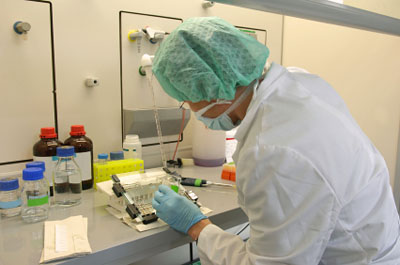
The trial allows investigators to rapidly determine patient eligibility at the time of diagnosis, eliminating the often lengthy process that can delay the start of standard therapy.
Posted Sept. 22, 2010
A UC Davis researcher and collaborators from UC San Francisco have received national recognition for groundbreaking work to develop a paperless information system to help speed discovery of new breast cancer therapies.
Mike Hogarth, professor of pathology and laboratory medicine at UC Davis, won an Advancing Innovation Award from the National Institutes of Health. The awards were announced recently at a ceremony in Washington, DC. The event was part of a meeting of the Cancer Bioinformatics Information Grid (caBIG), an initiative of the National Cancer Institute to create a voluntary information network that enables clinicians and researchers to collect, analyze and share data to more quickly develop new approaches for the detection, diagnosis, treatment and prevention of cancer.
Hogarth, also a professor of internal medicine, was the chief architect of an information-management infrastructure created within the caBIG framework. The infrastructure integrates various streams of information to support a large and novel trial of potential new breast cancer drugs.
Entitled TRANSCEND (TRANSlational Informatics System to Coordinate Emerging Biomarkers, Novel Agents, and Clinical Data), the technology is being used by investigators involved in a multi-center trial which pairs five investigational cancer therapies with biological markers.
“You don’t have to keep on creating the next trial with another combination of novel agents. It’s very unusual. This is one way to really accelerate how discoveries occur and to accelerate the delivery of the data to those who make those discoveries.”
— Michael Hogarth
The trial, called I-SPY 2 (Investigation of Serial Studies to Predict Your Therapeutic Response with Imaging and Molecular Analysis 2), is unusual because it is “adaptive,” meaning that it uses information from one set of trial participants to make changes in the study for future participants as it moves forward. Only drugs that show promise pass into later stages of the study, and less-successful candidates are dropped and not available for future trial participants.
The trial design is expected to greatly speed the process by which new drugs are tested and approved for use by cancer patients.
“You don’t have to keep on creating the next trial with another combination of novel agents. It’s very unusual,” said Hogarth. “This is one way to really accelerate how discoveries occur and to accelerate the delivery of the data to those who make those discoveries.”
UC Davis Cancer Center is the only National Cancer Institute- designated center serving the Central Valley and inland Northern California, a region of more than 6 million people.
Its top specialists provide compassionate, comprehensive care for more than 9,000 adults and children every year, and offer patients access to more than 150 clinical trials at any given time. Its innovative research program includes more than 280 scientists at UC Davis and Lawrence Livermore National Laboratory. The unique partnership, the first between a major cancer center and national laboratory, has resulted in the discovery of new tools to diagnose and treat cancer.
Through the Cancer Care Network, UC Davis is collaborating with a number of hospitals and clinical centers throughout the Central Valley and Northern California regions to offer the latest cancer-care services. For more information, visit www.ucdmc.ucdavis.edu/cancer.
The trial allows investigators to rapidly determine patient eligibility at the time of diagnosis, eliminating the often lengthy process that can delay the start of standard therapy. Individual clinical data, biopsy results, tumor analyses and other molecular biomarker information are captured at the outset and entered into the system, which then automatically randomizes patients into either the investigational or standard therapy arm of the trial. Investigators from all participating cancer centers use the same information system and can store, share and retrieve trial data in real time.
Ralph deVere White, UC Davis Cancer Center director, said the technology will greatly enhance cancer clinical trials.
“We are very proud of the recognition of Dr. Hogarth’s truly outstanding work,” he said. “What he has built will not only help patients on the I-SPY 2 trial, but will hasten the day when trials can be done faster and more accurately while being individualized for each patient.”
Hogarth said technology employed in development of TRANSCEND will be used in the information management of the ATHENA Breast Health Network, a large-scale project recently launched to merge research, technology, financing and health-care delivery among five University of California health centers, including UC Davis, to revolutionize breast cancer care.
In addition to Hogarth, other members of the TRANSCEND team receiving the Advancing Innovation Award today are researchers at the University of Pennsylvania and UC San Francisco, including Laura Esserman, director of the Carol Franc Buck Breast Care Center at UC San Francisco and principal investigator of the I-SPY 2 trial.